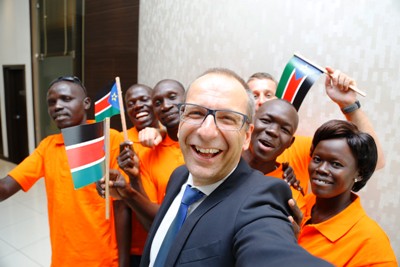South Sudanese project wins prestigious Nestlé award
October 12, 2014 (NAIROBI) – Nestlé announced that Honey Care Africa, an East African fair trade honey company in South Sudan, was the winner of its overall Creating Shared Value (CSV) prize.

The announcement was made last week at the sixth CSV forum in Switzerland.
“We are delighted that Nestlé have recognised the potential our project has in empowering the lives of smallholder farmers. The prize money will be vital to help us scale-up the reach to more farmers and help them to become commercial beekeepers by 2017,” said Ryan Marincowitz, country manager for Honey Care South Sudan.
According to Marincowitz, the CSV prize is such a wonderful recognition of the hard work and passion of our team, farmers, and customers in Africa.
“And what is even more exciting is the opportunity to build a long-term relationship with Nestlé, as we leverage our sustainable local supply chain with Nestlé’s global resources and expertise,” he said.
According to the CEO of Nestlé Equatorial Africa, Cornel Krummenacher, the award is given to innovative businesses that create value for their communities by addressing issues such as nutrition, water or rural development.
MSABI, a Tanzanian NGO that runs one of the largest rural, water, sanitation and hygiene programmes in the country, and Sanergy, a Kenyan social enterprise which collects and transforms human waste into fertiliser or energy, were named the runners up for Nestlé’s CSV prize.
Honey Care Africa has reportedly been operating for over 10 years throughout East Africa, and has deployed more than 30,000 beehives to smallholder farmers during that time.
South Sudan has potential to be one of the largest honey producing regions in the world and it is therefore critical to develop ways to sustainably monetise the forest assets or local populations will continue to encroach on these global assets, Honey Care Africa officials in the country say.
(ST)
